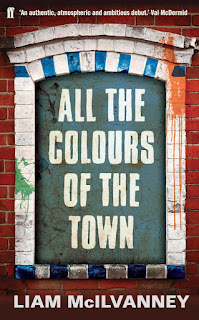All The Colours of the Town - Liam McIlvanney
All The Colours of the Town deals in the sordid business of sectarian hatred, a murky affair where enmity has become a tradition, kept stoked up more through football rivalry and citizenship of one of the closed ghettos of Belfast or Glasgow than through any personal experience in the new peace-process, city-of-culture, tourist-friendly faces offered by the twin cities of today. Picking at the scabs of The Troubles of the 80s that now seem so far back in the past hardly seems relevant for a present-day thriller, but Liam McIlvanney understands the connection and manages to draw other issues from it. Beneath the mindless bigotry and hatred of the past there are interesting questions raised about the nature of loyalty and betrayal, the sordid truths behind the façade of respectability, the common characteristics and lust for power that drive both gangsters and politicians. Even the nature of journalism and the quest for truth and justice are called into question.
The writing is superb in this respect, sustaining the narrative drive while peppering the prose with original and poetic observations on subjects that one wouldn't think merit such consideration. The author is able to mull over experiences and descriptions beautifully and meaningfully in this way (Belfast "curled like a dog in its basket of hills", a pint of Guinness "a brown commotion settling towards a creamy head"), never resorting to cliché or falling back on the stereotypical characterisation and dialogue all too often found in films and drama set in Northern Ireland, but genuinely finding a fresh new perspective from which to view the changing face of the new social and political landscape, without forgetting the shaky foundation that it is built on.
Most importantly, McIlvanney never loses sight of the purpose of the story, keeping the reader involved in the development of the investigation, digging beneath the surface of the main characters for their motivations as much as he does to crack open the story, delivering on both accounts and making the novel all the more meaningful and authentic for it.




Comments
Post a Comment